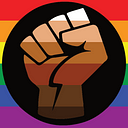It’s time to stop using the words ‘homosexual’ and ‘heterosexual.’ Here’s why.
Words that present themselves as ‘scientific’ and ‘proper’ on the surface secretly represent a threat to people of marginalized genders and sexualities.
Many of us — sometimes with good intentions, other times without — often resort to using terms like ‘heterosexual’ and ‘homosexual’ when we want to sound “intelligent”*, professional, or just more accurate. But when we’re talking about the experiences of sexual attraction, which are just too complicated to be reduced to simple terms like these, the correct move is away from this pseudo-scientific vocabulary and towards terms that are more casual and personal.
Referring to the identities of individuals in scientific terms dehumanizes the person the word is trying to capture the essence of. We should focus on using language that captures the lived experiences of what it is like for an individual to experience an identity, and we should to this by listening to individuals and asking them what terms best describe their genders and sexualities. The only words you should use to describe a person are ones they have told you they feel comfortable with you using — not the general terms society has already normalized.
“Scientific” labels that generalize identity distance the individual from what they feel about their own lived experience (read further: my article on the problematic nature of the word asexual). The way an identity impacts the individual is lost when we use universalizing language, and people of marginalized identities cannot afford to have their experiences erased this way. Identity is not an abstraction, but something that has very real effects on one’s life, and the more marginalized you are, the more true this becomes. Not all members of a category as broad and as arbitrary as “homosexual” experience “homosexuality” the same way. We have to stop painting all brushes with the same stroke, and step away from the universal towards the personal.
Secondly, establishing any form of a connection between science and gender is inherently flawed, for two main reasons. Firstly, science has always been used as a weapon of oppression against people of marginalized genders and sexualities. Not real science, that is, but patriarchal pseudoscience coined by male researchers to maintain their power by creating justification for an unnatural system that oppresses non-cis-men. The gender binary and compulsory heterosexuality are just two symptoms of a larger system which aims to subdue and oppress individuals who fall outside of the rigid categories of white, male Imperialist Colonialist domination. We have to continue unlinking the words we use to describe ourselves from the words that have been used to repress us. Furthermore, what science actually shows us is that gender falls apart the moment it is scrutinized. Intersex people exist. Transgender people exist. People outside of the gender binary exist. Science confirms their very existence, and in doing so confirms that a binary is an inherently flawed model by which to examine and classify humans because so many of us will never fall within its boxes.
The terms ‘heterosexual’ and ‘homosexual’ are loaded with the implications of this very gender binary we ought to be seeking to abolish. Hetero- means “opposite of,” while Homo- means “same as.” Heterosexual and homosexual translate to “sexually attracted to the same sex,” and “sexually attracted to the opposite sex,” which function on the assumption that there are two sexes, and that they are biological and fixed. Terms like these will always be regressive because they cannot be uncoupled from the gender binary, and so we have to do away with them altogether.
Words like these do not leave room for the nuanced perceptions and descriptions of relationships existing between non-binary, transgender and two-spirit individuals; and suggest that relationships are either with somebody of the same assigned sex, or of the opposite assigned sex, as you. There is so much more to sex and relationships besides the genitals one was born with, and terms like these reduce these complicated dynamics to the body parts of the people who are attracted to each other. This brings us back to the first notion, of how terms like these fundamentally dehumanize us; by restricting us to genital function and not complex individuals with complicated inner lives.
As always, my solution moving forward is not to assign labels to others, no matter what your intentions are, and instead, start getting used to just waiting for them to tell you how they feel about themselves. When you allow for the oppressed to pick and choose the words that define their own identity, you take the power away from their oppressors and you put it back where it rightly belongs. A person who traditionally might fall under the category of “homosexual” might just use a word you’ve never even heard of before to describe what they experience, or even a word they’ve made up themselves. It is your job to see them on their own terms, instead of asking them to describe something as personal as their own identities in yours.
— a. j. morgan-kelly//decolonize. resist. liberate.
*I do my best to resist using language that refers to the pseudo-scientific concepts relating to “intelligence,” as the idea that some of us have more competent minds than others as a result of genetic predisposition is but a construct of whxte, Western heterocispatriarchs used to establish and justify their own surpremacy. Here, I had to employ it in order to describe how people wish to be seen when they use language like hetero/homosexual, and so I apologize if my use of the word contributed to its normalization in any way.
